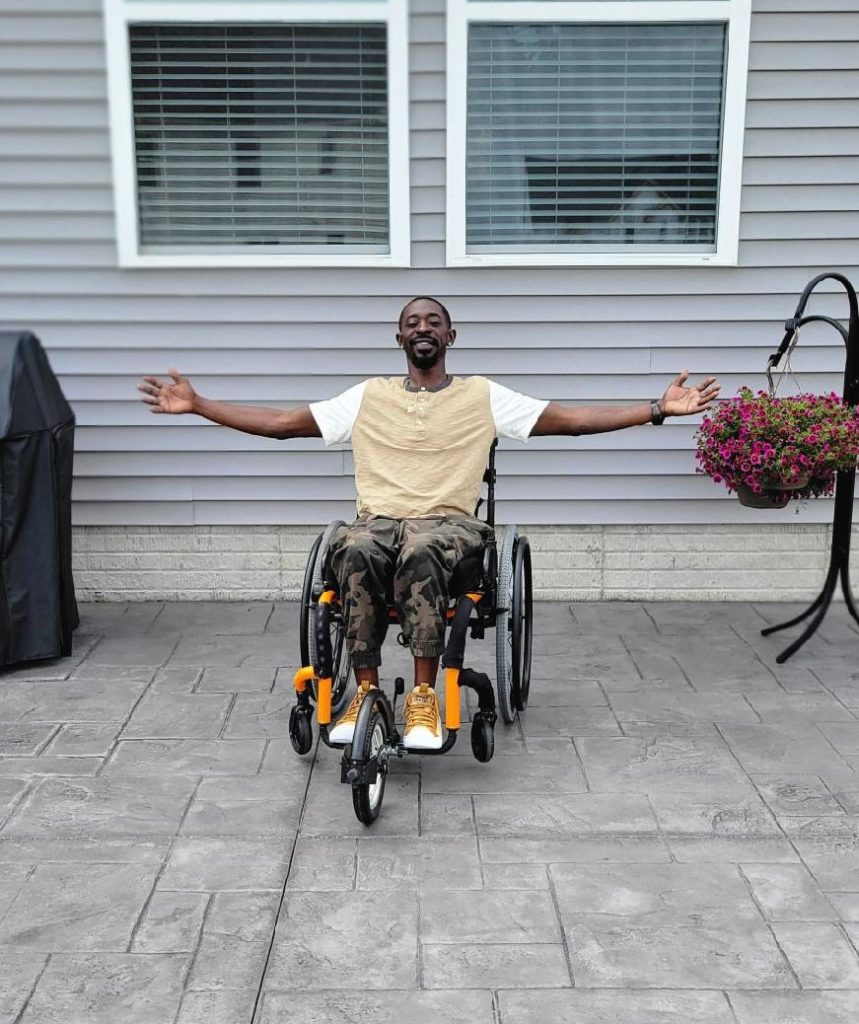It was a normal day around 10 in the morning; I took the day off work and my wife and I were on our way to pick up my mother to spend the day with her. About 10 minutes from her house, someone ran a red light and my car spun around and hit my car on the rear backside. Everything flashed, and the next thing I knew, I was paralyzed.
I knew right away that I was paralyzed. It wasn’t my first car accident, so I knew something was different this time. I asked my wife if she was okay, and she was, but I knew I wasn’t. The paramedics showed up and began to stabilize me and placed a neck brace on me. I was taken to University Hospitals and went through a 6-hour surgery to fuse my C5/6 vertebrae with a metal cage.
When I woke up from surgery, my wife told me it was around 11:30 p.m., and I remember lying in bed thinking that this was the worst day of my life. After a couple of days at UH in the trauma unit, I was transferred to the MetroHealth Inpatient Rehabilitation Program to learn how to adjust to living and functioning now with a spinal cord injury. I arrived on a Saturday, and the very next day early in the morning I was in therapy twice a day.

My spinal cord injury diagnosis is a C8 incomplete tetraplegic. My right side of my body was severely affected by the accident due to nerve damage. However, my hand strength has improved over the years due to therapy, and now I can wiggle my toes on my left foot. My daily routine involves stretching and physical therapy exercises. When life allows, I work out and do exercises that help with my mobility. Staying active also helps my mental health. It may take some time to get comfortable being out in the world as a wheelchair user, but don’t let that stop you from learning new skills or trying new activities. I’ve tried wheelchair football, wheelchair basketball, even hand cycling, and I hope to try sled hockey soon God willing.
The more you push yourself, the more growth you will see, and the more you will learn about yourself. There are areas where I can improve and I am confident that one day I will be able to do even more than I am able to do now if I continue to work hard. You never know how strong you are until being strong is all you can be.
My goal is to motivate and inspire others to stay active and lean into the opportunities that come to you in life.
My biggest advice for anyone that is new to living with a spinal cord injury is to learn to listen to your body. Your body changes after SCI. Bowel routines, skin care, and pressure sores if unmanaged can add to complications. Something simple as foods, that you were used to be able to eat (but are unable to after your injury) or the type of clothing you used to wear have to be reevaluated.
Another piece of advice I would like to offer would be to research as much as you can because there are a lot of resources available to SCI patients. Mobility devices such as wheelchairs, smartdrives, grabbers, electronics, or other assistive technology are very helpful to SCI patients. They help provide more independence and a greater quality of life.

I wish I had a peer mentor after my injury to talk about this new life. This person can be an outlet for you, give you advice, and know exactly what you are going through. Since my injury, I have been motivated to become a peer mentor, volunteering when I can, and just recently became the Peer Mentoring Coordinator for the United Spinal Association of Northeast Ohio. I wanted to be a bridge for others to know they are not alone and to help encourage others and offer all the knowledge I acquired so they too can be a bridge for someone else.
